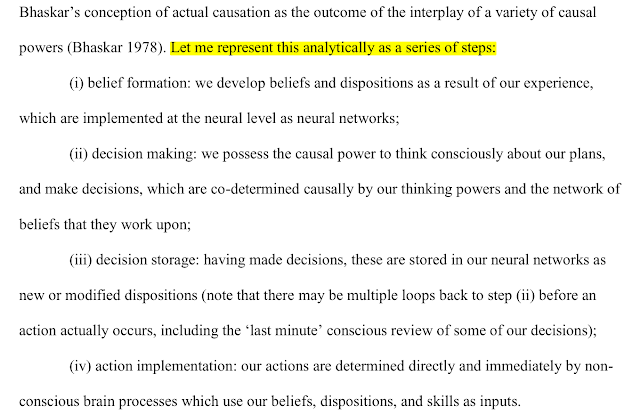Paper:
Original: Elder‐Vass, D. (2007), Reconciling Archer and Bourdieu in an Emergentist Theory of Action*. Sociological Theory, 25: 325-346. doi:10.1111/j.1467-9558.2007.00312.x
Habitus (Bourdieu): Systems of durable, transposable dispositions, structured structures predisposed to function as structuring structures (Bourdieu 1990b, p. 53).
Bourdieu vs Archer
The emergence of the mental: A theory of human action based on the argument that we human individuals do, as Archer claims, have emergent causal powers of our own
Conclusions:
1. From Archer, this theory takes both her ontological insistence on the distinct existence of
uniquely human causal powers and her theoretical insistence on the need to take account of conscious reflexive deliberation in the explanation of human action
2. From Bourdieu, the theory takes his penetrating examination of the construction and
operation of the habitus, and his recognition that our socially-influenced beliefs contribute to our reproduction of social structure
3. This framework is a coherent view of how human action can be the product of “a permanent dialectic between an organizing consciousness and automatic behaviours” (Bourdieu 1990b, p. 80)
Original: Elder‐Vass, D. (2007), Reconciling Archer and Bourdieu in an Emergentist Theory of Action*. Sociological Theory, 25: 325-346. doi:10.1111/j.1467-9558.2007.00312.x
“This paper will advance a theoretical account of human action that rests upon an emergentist ontology. Individual agency, in this theory, may be identified with the emergent causal powers of human individuals.”
Habitus (Bourdieu): Systems of durable, transposable dispositions, structured structures predisposed to function as structuring structures (Bourdieu 1990b, p. 53).
- 1. The habitus, produced by social conditioning, tends to encourage us to behave in ways that reproduce the existing practices and hence the existing structure of society; and in some cases embedded in the most physical ways in which we use our body, becoming “embodied history, internalized as a second nature and so forgotten as history” (Bourdieu 1990b, p. 56)
- 2. Dispositions that make up the habitus ...... provide a “generative capacity” (Bourdieu 1990a, p. 13; Bourdieu 1990b, p. 55). It should be noted that dispositions' generative capacity does not indicate conscious deliberation of action necessarily.
- 3. Bourdieu may not deny that actors can do conscious decision making but tends to be dismissive of conscious decision making. furthermore, Bourdieu will consider conscious deliberation when mismatches happen.
Bourdieu vs Archer
- 1. At the theoretical level, the conflict turns on the extent to which human beings influence their own destiny
- 2. At the ontological level, the question turns on whether social structure can be seen as distinct from human beings or whether the two are mutually constitutive. (conflationist or emergentist)
The emergence of the mental: A theory of human action based on the argument that we human individuals do, as Archer claims, have emergent causal powers of our own
- 1. Mental states are thus emergent properties of neural networks, and can therefore be causally effective
- 2. Davidson has famously argued that mental entities, specifically reasons, can be causes of our actions (2001).
- 3. Decisions, then, do not seem to produce behaviour directly, but rather produce dispositions to behave in a given way in the future in certain circumstances
Conclusions:
1. From Archer, this theory takes both her ontological insistence on the distinct existence of
uniquely human causal powers and her theoretical insistence on the need to take account of conscious reflexive deliberation in the explanation of human action
2. From Bourdieu, the theory takes his penetrating examination of the construction and
operation of the habitus, and his recognition that our socially-influenced beliefs contribute to our reproduction of social structure
3. This framework is a coherent view of how human action can be the product of “a permanent dialectic between an organizing consciousness and automatic behaviours” (Bourdieu 1990b, p. 80)

Comments
Post a Comment